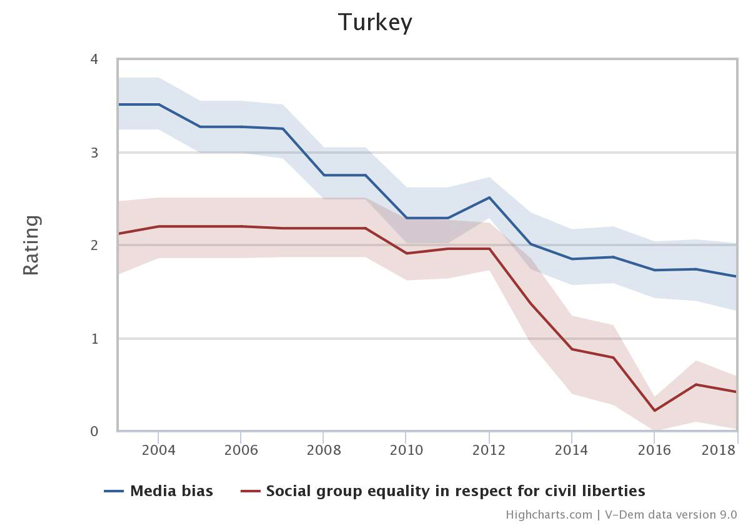Elections in Turkey
By: V-Dem Staff
Apr 16, 2019
Local elections were held in Turkey on 31 March 2019 with unexpected results. The current President, Recep Tayyip Erdogan and his Justice and Development Party (AKP) suffered big losses. At the same time, the elections were a political triumph for the Republican People’s party (CHP), a secular opposition party, which won a considerable amount of the votes.
Erdogan and the AKP have dominated Turkish politics since 2003. In 2017, constitutional changes introduced a presidential system. The prime minister was abolished, centralizing executive power in the presidency. Additionally, these constitutional changes discriminated against the opposition parties, making it harder to challenge Erdogan and the AKP in elections. Erdogan and his party won both the presidential and parliamentary elections in 2018. Their impartiality was questioned by international observers due to media censorship and the harassment of opposition candidates. According to the Westminster Institute, the rights of ethnic and religious minorities have suffered in comparison to the Sunni Muslim majority under Erdogan’s rule.
V-Dem’s Country Graph tool, illustrates the changes in media bias, and respect for civil liberties in Turkey since 2003. There are secular declines in both indicators with a pronounced dip in 2012. Media bias measures discriminatory coverage at the expense of the opposition. It ranges from 0 to 4 with 0 indicating no political coverage of the opposition and 4 - impartial coverage of all parties. Respect for civil liberties investigates the extent to which social groups enjoy the equivalent levels of civil liberties. It ranges from 0 to 4 with 0 indicating that some social groups enjoy substantially weaker protection of civil liberties and 4 – that all social groups are treated equally.
To learn more about V-Dem indices and tools, please visit v.dem.net.


